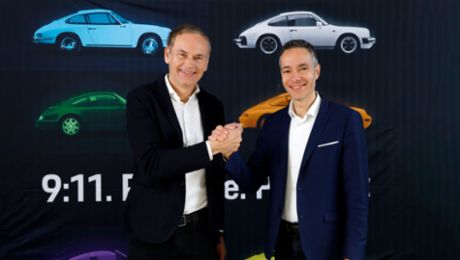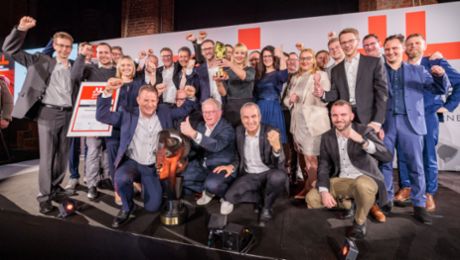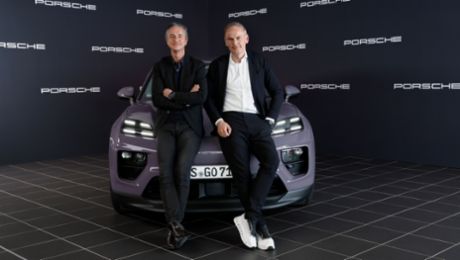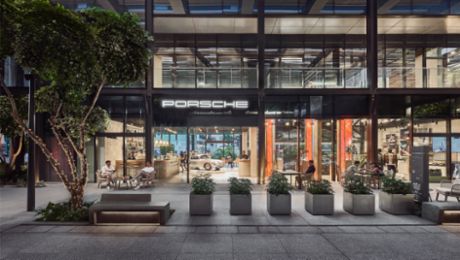Mr. Blume, Porsche has again achieved some record figures in your eighth year as Chairman of the Executive Board, and the results are tangible. How does this multi-year success story make you feel?
Oliver Blume: Success is always the result of teamwork. And we’re a strong team. We’ve managed to continue developing Porsche over the years and find new motivation time and again after all these years of success. At the center of it all are our products, which combine our Porsche values with state-of-the-art technology. For us, it’s all about thrilling our customers and fulfilling their dreams with each and every car. Financial successes are the result of a successful strategy. We’ve managed to more than double our sales revenue and operating profit in recent years. But there are no coincidences in the automotive industry. Success takes planning. We have a consistent strategy with a concrete concept for implementation. For me, it’s important that we don’t rest on our laurels. As in motorsport, every race begins at the starting line. If I don’t refocus my efforts every time and have the drive to win, I won’t be the first to cross the finish line.
You say that success takes planning. Is there a secret formula for this?
Oliver Blume: I don’t have a secret formula, but I do have a philosophy and method for managing the company. My aim is to apply these specifically to the conditions at hand and any questions that arise. It’s just like in sports. Experience can be helpful—and so can strategic preparation and structured implementation. Basically, my formula is this: first, analyze the situation with precision; second, prioritize topics and responsibilities; and third, make decisions strategically and with foresight—and implement these with a high degree of determination. I provide our teams with guardrails that offer guidance, but also the leeway they need to flourish, develop ideas, and operate in an entrepreneurial way. The key to success is everyone working for the benefit of the team, the company, and our customers. For me, it’s all about the right mindset and team spirit.
So it’s about pragmatic guidelines rather than visionary ones?
Oliver Blume: It ultimately comes down to pragmatism, especially in eventful times like these. Targets set the benchmark. It’s essential to make them ambitious, but also achievable. I’m a pragmatic manager. When it comes to setting goals, I think in terms of the big picture, but also in stages. It’s like preparing for a hike. It all comes down to which peak we plan to climb and which route we’re going to take. For example, why the northern route is better than the southern route. We organize our gear and pack our backpacks carefully. And then we get on our way. We don’t need to know exactly what the final leg of the trail will look like when we set off. It’s important to get started and then make decisions based on the situation, never losing sight of what we plan to achieve over the long term. Our strategy shows us the way, and our annual priorities shape the stages. The summit is our goal, and we approach it one step at a time.
Does that make transformation a competition in stages?
Oliver Blume: Transformation in the automotive sector, with the key issues being around digitalization, sustainability, and electric mobility, is the biggest upheaval we have seen in the history of our industry. It’s so much more than just changing technology, too: new organization and processes also play a key role. We’re talking about a period of more than 15 years, and we have about a third of that already behind us. There are some important things that still need to be done, such as increasing the efficiency of electric mobility, expanding renewable energies, establishing a comprehensive charging infrastructure, and decarbonizing the company. Different regions of the world will transform at different speeds, which our product strategy takes into account. We’re positioned to be flexible. Electric sports cars are a clear priority, but we’ll continue to offer combustion engine cars and hybrid drives throughout the period of transformation.
And won’t it take a lot of courage, too?
Oliver Blume: Without a doubt. At Porsche, we entered the field of electric mobility at the end of 2015, which was very early. At that time, the decision to develop the Taycan required a lot of courage. I remember my first Supervisory Board meeting as Porsche CEO as if it were yesterday. We were talking about billions in investment, which represented a new path for us. And more than just a few were skeptical whether it was the right path for Porsche. But when the factory opened its doors in fall 2019 and the global premiere was a huge hit, everyone realized that the Taycan would be a success. We had produced the 100,000th Taycan by the end of 2022, which was followed by more than 40,000 cars in 2023 alone—and that was the last cycle year of the first generation. And now the new Taycan is coming—and setting new technological benchmarks.
Were those notable stage wins?
Oliver Blume: Yes, because they provide us with a sense of optimism and self-confidence and are a validation of the path we have chosen. Now we’re approaching the next major leap in development. Our all-electric vehicles will be even more powerful and efficient—and therefore even more attractive. In addition to the second generation of the Taycan, we’re also launching the all-electric Macan in 2024. Both vehicles define the sports car in their segment. Porsche and electric powertrains go hand in hand. Our electrification ambition is to deliver more than 80 percent of our new cars fully electrified in 2030—depending on the demand of our customers and the development of electromobility in the respective regions of the world. We are also working towards a net carbon-neutral value chain of our newly produced cars in 2030.
The new Macan and the next generation of the Taycan are the benchmark.
Oliver Blume: The new Taycan and the all-electric Macan will demonstrate our extraordinary performance and quality standards in the years to come. Thanks to 800-volt technology, it only takes 18 minutes to charge the Taycan from 10 to 80 percent. When it comes to driving characteristics, the new Macan is the benchmark of its class, thanks to state-of-the-art rear-axle steering and precise all-wheel control. We’re also taking a giant step forward in terms of software, with response times comparable to those of a tablet. The system responds in a matter of seconds. When you enter your navigation destination with voice command, even a much longer route will appear immediately. Charge planning is calculated just as fast and with the same level of precision.
You’ve positioned Porsche as a luxury brand. What exactly makes it so?
Oliver Blume: It’s important to think about how Porsche defines luxury in general. We know that our customers fulfill their dreams with a Porsche. They benefit from the perfect combination of iconic legacy and sporty, state-of-the-art luxury. Our sports cars not only boast extraordinary design, quality, and technology, but also offer irresistible exclusivity and performance. In addition, we combine an outstanding product with a very personal experience and a brand that assumes responsibility in society. As far as I know, that’s unique throughout the luxury car segment.
At the very core, it’s all about sports cars. Your products are extremely appealing.
Oliver Blume: Sports cars form the core of our brand. It’s always about the right technical concept, product substance, performance, design, and quality. Customers choose a brand they identify with. Customers buy brands—and icons shape them. Iconic products like the 911. You can go on and on describing your new Porsche 911 to friends—full of emotion and enthusiasm. But you can also just look at it. For yourself. It’s at this moment that luxury becomes tangible. At Porsche, we stand behind our values, our identity. Porsche has always remained true to its roots. I can always see that a 911 is a 911, and compare it with the first one from 60 years ago. A Porsche is iconic and timeless. It’s so very recognizable.
And so this brand recognition becomes a part of my world?
Oliver Blume: Yes. The car I drive is part of my personality. In a broader sense, that also applies to values and products in other segments. Fashion is a prime example. People buy certain clothes and even furniture because they identify with them. Take me, for example. I drive a 911 and a Taycan, prefer Apple devices, and have a Barcelona chair by Mies van der Rohe. Many of our customers are open-minded and design-oriented and value modern technology. Everyone has aspirations and dreams—and we want to fulfill these with our sports cars.
So a life with Porsche and other quality brands I identify with allows me to be part of a community with shared values?
Oliver Blume: I can confirm that for Porsche. It’s not about mass consumption. Porsche is special—innovative and yet highly durable. Unflappable, with great attention to detail. A Porsche always cuts a fine figure, whether it’s on the racetrack, at one of our Experience Centers, parked in front of the opera house, or cruising along the great boulevards. It’s also important to us to consistently pursue our ambitious sustainability targets and the social responsibilities of Porsche. We’re strategists and doers here, too. It’s important to the large community of Porsche customers and fans that we as a company assume responsibility. That, too, is part of our identity.
"Porsche is the perfect combination of iconic legacy and sporty, state-of-the-art luxury." Oliver Blume, Chairman of the Executive Board
You emphasize just how innovative and detailed Porsche has been over the decades. The iconic 911 has been proof of that for 60 years.
Oliver Blume: Pioneering spirit is a common thread throughout the model’s entire history. Groundbreaking innovations have found their way from the racetrack to the 911 road car. One such example is the turbocharger, which was developed in the 1970s—first in the legendary Le Mans race car and then in the 911 Turbo production cars. The technology has continued to improve over time. Take for instance the variable turbine geometry, which ensures optimal flow for all operating modes and was integrated into the 911 in 2006. Another example is the Porsche dual clutch transmission (PDK), which proved its worth in racing and was then incorporated into the 911 model line in 2008. It’s just about impossible to imagine the 911 without it today. Or the sporty all-wheel drive, which helped the 959 win the Paris–Dakar Rally in 1986 and made its debut a short time later in the 911 Carrera.
Sustainable mobility will be even more of a concern for all future Porsche projects.
Oliver Blume: Like technology, performance and timeless design, sustainability needs to play a larger role in our sports cars. A current example is high-performance battery cells. We’re working with our subsidiary, the Cellforce Group, to develop a cell with a much higher percentage of silicon in the anode and therefore much higher energy and power density. The Cellforce cells are the ideal form of energy storage for high-performance all-electric sports cars.
You’re also going your own way with your commitment to eFuels.
Oliver Blume: We think about climate protection as a whole, which is why we’ve opted for a double “E” solution: electromobility and complementary eFuels. Renewable, synthetic fuels allow combustion engines to operate potentially nearly carbon-neutral. We’re thinking in terms of solutions for existing cars. There are currently 1.3 billion cars with combustion engine on the road today, many of which are quite old. As an admixture in fuel, eFuels can reduce CO₂ emissions. Aviation and shipping also requires synthetic fuels. Our eFuels pilot facility in southern Chile has been producing synthetic fuel since the end of 2022. The system is designed for a maximum production capacity of 130,000 liters, with the fuel initially used for the Porsche Mobil 1 Supercup and other lighthouse projects.
And now you’re going one step further and optimizing the facility. Is this another groundbreaking achievement?
Oliver Blume: Absolutely. It’s based on the direct air capture (DAC) process, which we view as highly relevant future technology on the verge of series development. By extracting larger amounts of carbon dioxide from the atmosphere, this technology can potentially help achieve global climate targets. We’re working with partners to integrate this DAC technology into our eFuels pilot facility.
And the final question: You often talk about sustainability. Is it a matter that’s close to your heart?
Oliver Blume: Without a doubt. Sustainability is one of the most important responsibilities of our time. It’s everyone’s job to protect the world for future generations. We at Porsche aim to assume responsibility for sustainable operations—for the environment and for society. That’s very important to me personally.
The content of this website presents selected information from the annual and sustainability report 2023 of Porsche AG. All information therefore relates to the reporting date and has not been updated since its publication on March 12, 2024. The German PDF document of the annual and sustainability report is legally binding.



